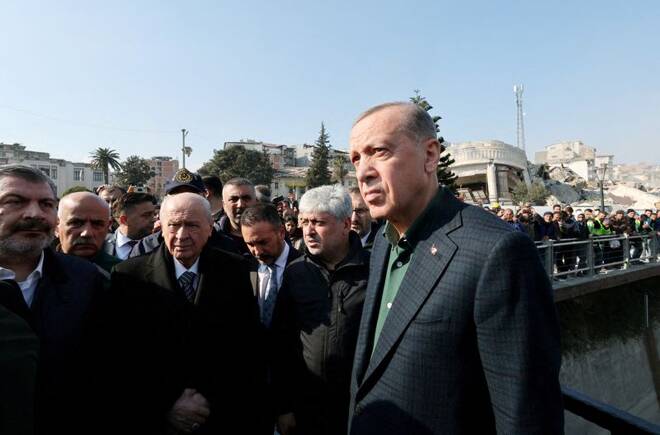Advertisement
Advertisement
Pollsters see support for Erdogan’s AKP largely unscathed despite quake
By:
By Birsen Altayli and Humeyra Pamuk ISTANBUL (Reuters) - Turkish President Tayyip Erdogan's ruling AK Party, facing elections in May, appears to have largely retained its support after last month's earthquake, pollsters said on Friday, despite widespread criticism of its initial response to the disaster.
By Birsen Altayli and Humeyra Pamuk
ISTANBUL (Reuters) – Turkish President Tayyip Erdogan’s ruling AK Party, facing elections in May, appears to have largely retained its support after last month’s earthquake, pollsters said on Friday, despite widespread criticism of its initial response to the disaster.
Two polls this week showed the opposition had not picked up fresh support, partly due to its failure to name a candidate with just two months left before the vote, and partly due to its lack of tangible plan to rebuild areas devastated by the quake.
“The earthquake has not caused the government to weaken as much as the opposition would have expected,” Ozer Sencar, chairman of the polling company Metropoll, told Reuters.
His company’s polling data puts Erdogan’s alliance with the nationalist MHP in the lead in the event of an imminent election, even though it has lost several percentage points of support compared to January.
More than 45,000 people were killed in Turkey and more than a million left homeless by two massive earthquakes which struck Turkey’s southeast on Feb. 6 – the worst disaster in the country’s modern history.
Erdogan indicated on Wednesday that elections will be held on May 14, sticking to his previous plan for the vote despite some questions about the feasibility of voting across the heavily damaged earthquake zone.
The immediate aftermath of the disaster was dominated by reports that the government’s search and rescue teams were overwhelmed and too slow to dispatch their teams. Others criticized the government’s lax enforcement of building safety standards that they said caused even new homes to crumble.
Promises to rebuild
Erdogan publicly acknowledged the problems in the early days but then defended his government’s response. He swiftly pledged to rebuild homes, a promise that is likely to help him maintain support among the electorate, said Mehmet Ali Kulat, chairman of the MAK polling company.
“When people go through such a disaster, we see psychological reactions for a few days and that is directed at the government. Once 15-20 days pass, they stay close to whoever promises to rebuild their collapsed house or workplace. That could be an advantage for the government,” Kulat said.
In surveys carried out following the earthquake, support for Erdogan’s alliance with the nationalist party appeared around 40-41 percent, Kulat said, without providing a comparison.
Another survey conducted by Istanbul Economics Research between Feb. 16-20 with 2,000 participants showed a slight increase of 0.1 points from January for Erdogan’s success score.
Thirty-four percent of the respondents in the survey, dubbed the “Turkey Report” said building contractors were those most responsible for earthquake damage, while 28 percent blamed the government.
AK Party voters overwhelmingly blame the contractors for the disaster, a reason why the loss of support in the ruling party has been limited, Sencar said.
Turkey’s rampant inflation and rising poverty eroded Erdogan’s popularity last year but he has since managed to recover some support by announcing increases in the minimum wage and steps to facilitate early retirement.
“Following the initial stumble, we have seen the government come up with a more unifying language,” said Nezih Onur Kuru, a researcher with the TEAM research group. “The government has successfully created a perception that it is the one helping heal wounds,” Kuru said.
That seems to have helped Erdogan’s poll ratings. His alliance with the Nationalist Movement Party (MHP) has kept its support level of 44 percent in the aftermath of the earthquake, according to a survey by TEAM, conducted with 1,930 people on Feb. 19-20.
(Reporting by Humeyra Pamuk, Additional reporting by Azra Ceylan and Orhan Coskun; Editing by Daren Butler and Christina Fincher)
About the Author
Reuterscontributor
Reuters, the news and media division of Thomson Reuters, is the world’s largest international multimedia news provider reaching more than one billion people every day. Reuters provides trusted business, financial, national, and international news to professionals via Thomson Reuters desktops, the world's media organizations, and directly to consumers at Reuters.com and via Reuters TV. Learn more about Thomson Reuters products:
Advertisement
